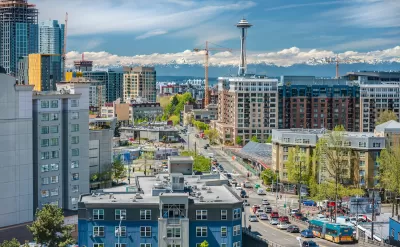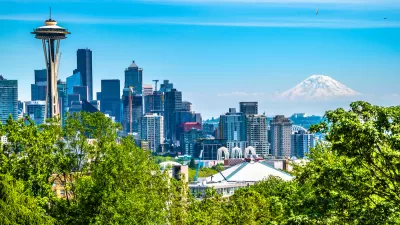Voters approved a corporate tax to fund the city’s housing authority despite an opposition campaign funded by Amazon and Microsoft.

In a recent Seattle ballot referendum, voters approved a measure to create a corporate tax to fund the city’s housing authority with 63 percent of the vote, reports Roshan Abraham in a Next City/Shelterforce article.
This in spite of an opposition effort funded by some of the city’s biggest corporations — a strategy that likely backfired. According to Tiffani McCoy of housing nonprofit House Our Neighbors, “We capitalized on the fact that Amazon and Microsoft were dumping in $100,000, and we made clear to voters that these corporations don’t want you to have social housing.”
The housing authority was approved by voters in 2023, but the February referendum created a crucial funding source. “The first question on the ballot asked if voters approved of funding the new authority using payroll taxes. Next, voters had to choose whether they wanted a new 5% payroll tax on individual compensation above $1,000,000, paid by companies, or to use an existing payroll tax that mostly funds affordable housing.”
Abraham explains how the housing authority will work to provide housing stability for low-income and fixed-income residents. “The authority will issue its own debt in the form of bonds and create a revolving loan fund, lending itself money for construction and acquisition that would be paid back through rents, with higher rents subsidizing lower rents.”
According to Abraham, “The win suggests a way forward for organizers on the local level to take the housing crisis into their own hands.”
FULL STORY: How Social Housing Won in Seattle, Despite a Flood of Big Tech Money

Planetizen Federal Action Tracker
A weekly monitor of how Trump’s orders and actions are impacting planners and planning in America.

Map: Where Senate Republicans Want to Sell Your Public Lands
For public land advocates, the Senate Republicans’ proposal to sell millions of acres of public land in the West is “the biggest fight of their careers.”

Restaurant Patios Were a Pandemic Win — Why Were They so Hard to Keep?
Social distancing requirements and changes in travel patterns prompted cities to pilot new uses for street and sidewalk space. Then it got complicated.

Platform Pilsner: Vancouver Transit Agency Releases... a Beer?
TransLink will receive a portion of every sale of the four-pack.

Toronto Weighs Cheaper Transit, Parking Hikes for Major Events
Special event rates would take effect during large festivals, sports games and concerts to ‘discourage driving, manage congestion and free up space for transit.”

Berlin to Consider Car-Free Zone Larger Than Manhattan
The area bound by the 22-mile Ringbahn would still allow 12 uses of a private automobile per year per person, and several other exemptions.
Urban Design for Planners 1: Software Tools
This six-course series explores essential urban design concepts using open source software and equips planners with the tools they need to participate fully in the urban design process.
Planning for Universal Design
Learn the tools for implementing Universal Design in planning regulations.
Heyer Gruel & Associates PA
JM Goldson LLC
Custer County Colorado
City of Camden Redevelopment Agency
City of Astoria
Transportation Research & Education Center (TREC) at Portland State University
Camden Redevelopment Agency
City of Claremont
Municipality of Princeton (NJ)





























